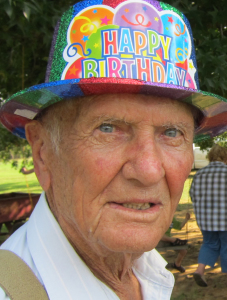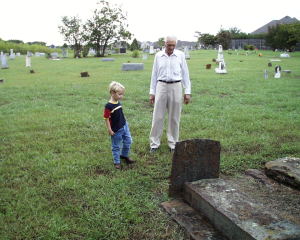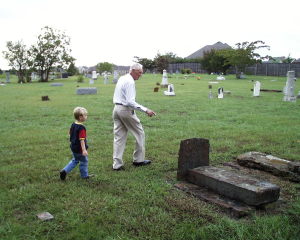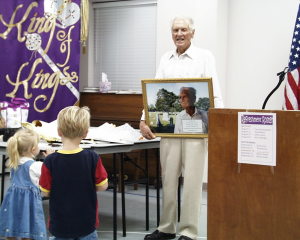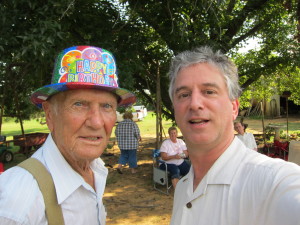A 93-old-old man who is undoubtedly one of the coolest fellows I ever met is about to have a day in his honor.
Congratulations to my pal, Jack Cook of Southlake, Texas, for the much-deserved “Jack Cook Day” on Saturday, Oct. 16, 2010.
I met Jack years ago when I joined the Lonesome Dove Cemetery Association. I've written many stories about Jack, and theree are copied below, if you're interested. They are among my most favorite stories.
First, here's the press release from Anita Robeson, the president of the Southlake Historical Society
Jack Cook, 93, of Southlake is a living link to historical events here and in Texas. He will be honored with a special proclamation by the city at 1 p.m., Saturday, Oct. 16, at Southlake’s log house, in Bicentennial Park off of White Chapel. The Southlake Historical Society is sponsoring the event.
“Jack Cook has generously given his time to help the historical society gather Southlake’s history,” said Anita Robeson, SHS president. “We hope everyone will stop by to say hi and congratulations to Mr. Cook.”
From 1-3 p.m., the log house will be open for people to look in. Furnishings will include a pegged bed and a six-board trunk from the mid-1800s.
The event will also be the debut of eight signs around the log house that describe who the earliest settlers were, what Texas was like when they arrived and how they lived. “The theme is ‘Home Sweat Home,’ because that’s what it was all about – hard work and family,” Anita said. The historical society wrote the signs, and Julie Landis of Grapevine designed them. A special feature on the signs is Bonnet, a blue dog who interacts with visiting children.
Jack’s roots in Texas run deep.
He has been president of the Lonesome Dove Cemetery Association since 1975 and was re-elected in September. Jack has helped care for the cemetery since he was a teenager and figures that half the people buried there are kin to him. His family has lived in this area since 1849.
On Easter Sunday 1934, Jack, then 17, passed by Bonnie and Clyde a short time before the gang killed two state troopers.
Jack attended the 1919 Carroll School in 1935 for tenth grade and is thought to be the oldest living student of that school.
Jack’s great-great grandmother Malinda Frost Dwight Hill, who is buried at Lonesome Dove Cemetery, was at Parker's Fort in 1836 when Cynthia Ann was taken by the Indians. Malinda’s father (Jack’s ggg grandfather) and brother were killed when they tried to buy time for the others to escape. Malinda, 16, her baby, husband, mother and others survived a harrowing trip on foot to safety.
The Southlake Historical Society will be offering tours to school, Scout and other groups. For information, see www.southlakehistory.org or call Connie Cooley at 817-223-9606.
# # #
I have some wonderful photos of Jack.
# # #
Here's story number one about Jack from 1994:
|
The cemetery records, being what they are, will never capture that moment of selflessness last week when Jack Cook, 76, insisted that he continue to mow the historic 2-acre Lonesome Dove Cemetery by himself- without pay.
No, the official records of the Sept. 6 annual meeting of the Regular Lonesome Dove Cemetery Association will simply note that the association met and enjoyed a lovely covered-dish dinner inside the fellowship hall at Lonesome Dove Baptist Church.
The minutes will impassively state that the eight members present voted 8-0 to increase the burial fee at Tarrant County's oldest church cemetery to $300 from $200, and that they re-elected Cook as chairman.
But the records won't show Cook's generosity. Nor will they capture the booted footsteps of an aging man walking back and forth across this hallowed earth – in memory of a 2-year-old son, in memory of quiet stones, in memory of all those lonesome cowboys.
For 147 years, this group and various church cemetery boards preceding it have cared for and revered this little patch of land where Tarrant County's forebears are buried.
Lonesome Dove Cemetery, off Lonesome Dove Road in Southlake, is the final resting place for many of Tarrant County's first pioneer settlers, first church leaders and first government officials.
Surprisingly, little has changed in a century and a half. The cost of joining the cemetery association is still $1 (or more if possible). The cost of burial remains less than at most cemeteries (and is free for those who can't afford it).
The downside is that wind, rain, vandals and livestock have knocked over many of the gravestones, quite a few of which were only cowboy stone markers in the first place.
And it's crowded: By some estimates, there are up to 1,600 graves within the 2.3 acres. Records were lost in a 1930 church fire, and existing records are sparse. The cemetery holds few burials these days.
But no one is discouraged.
“Well, this is my life,” Cook said. He's a native of what he calls “the Dove” – or old Southlake. “I was born here. My grandparents, parents, wife and child are buried here – and aunts and uncles galore. Half of all the people in this cemetery were kin to me some way or another.”
In the fellowship hall that night, biscuits, fried chicken, potato salad, beef stew, watermelon, broccoli and cornbread lined a long counter.
Cook said a prayer, then invited everyone to eat.
“Thanks to Jack, the cemetery looks good,” said Coy Quesenbury, pastor at Lonesome Dove, once the only non-Catholic church between here and the Pacific Ocean. All agreed with Brother Coy.
The ensuing discussion about cemetery maintenance might seem trivial to some, but perhaps these eight people had a bigger picture in mind: Maybe through the care they give this little patch of land, they show their reverence for family, for heritage, for the idea of eternity.
How much bigger can it get?
Betty Tanner, the group's secretary, raised the issue of Cook's mowing. She pointed out that he has been doing it for three years. “It's pretty difficult,” she said.
“It's not,” he protested. “It's pretty easy.”
No one believed him, but no one argued. Two acres and all those tombstones! And the man is 76 years old.
“It's great,” Tanner said, “but one day we're not going to have Jack to do this.”
There was a pause. No one said it, but everyone expected Jack to be around “the Dove” for eternity; he just might not be able to mow.
Finally, Jack spoke: “I hope to be able to do this for many more years. I enjoy it. It's not hard. I used to mow it and Weed-eat it all in one day. Now I stretch it out over two days.”
Somebody suggested reimbursing Cook for the repairs on his equipment.
He waved off the idea, citing the cemetery's investments: “The interest doesn't make that much. And we never use any principal.”
He called for adjournment.
“Well, we had a pretty good crowd,” he said. It was getting dark, and Cook took a quick stroll through the cemetery. He walked fast to beat the mosquitoes.
He stopped at his wife's grave, and the grave of their son, Tommy, who died at age 2 in a fire 44 years ago . . . and his grandparents . . . and his parents. And there – right there – was his spot. He had no use for it now, but it did need a mowing.
Cook won't give up his mowing without a fight. And the seven others at that lovely covered-dish dinner understood why.
It wasn't only this little patch of land at “the Dove.” It was the big picture – a reverence for family, for heritage, for the idea of eternity. How much bigger can it get?
# # #
Here's story number two about Jack from 1995:
|
The character of a Texan is no myth. A true Texan loves the bountiful land, is ever self-reliant and reveres the days gone by.
The lore of the frontier will never die so long as true Texans honor it, cherish it and pass it on to future generations.
So it was that a small group of Texans gathered Tuesday night in a quiet church fellowship hall in Southlake to honor the original frontier pioneers and the generations that followed them.
The Regular Lonesome Dove Cemetery Association meets once a year for a covered-dish dinner and business meeting. It's as close to the real Texas as you can find.
Ten people gathered inside Lonesome Dove Baptist Church, Tarrant County's oldest church, to talk of the cemetery outside. The fenced-in field of crumbling tombstones is the final resting place for many of Tarrant County's original government, church and school leaders.
Jack Cook, the president, called the meeting to order with a prayer honoring the dead a few yards away. “If it weren't for them, we wouldn't be here,” Cook said. “We are honored to serve them.”
The dinner was a feast. Cook and his wife, Dorothy, brought a chicken casserole, two chocolate pies, rolls and tea. Betty and Bud Tanner brought meat loaf, cornbread and mixed vegetables. Frances and Bill Hogue came with hot peppers and cake. And Martha Jo Burgess prepared deviled eggs and peach cobbler.
The youngest in attendance were Pastor Coy Quesenbury, 59, and Ernie Hoover, 60.
“The cemetery is not to the young people what it is to the old people,” Betty Tanner explained.
After dessert, Jack Cook, who will be 79 in two weeks, convened the business portion of the meeting. Cook, whose sharp blue eyes somehow make it look like he's always smiling, is the group's mainstay. Ever self-reliant, he regularly mows the 2.3 acres where an estimated 1,600 people are buried.
“One of these days, I'm not going to be doing this,” Cook said. “What I have is terminal.” He paused. “Old age.”
After everyone laughed, Cook became serious. “I've already picked out my spot,” he said.
“If anybody deserves a spot, you do,” Pastor Quesenbury said.
Everyone appreciates Cook's work. It takes him four hours to mow the cemetery and four hours to cut the weeds.
“You can come in the morning, the afternoon and the evening, and Jack's out there, soaking wet,” Burgess said.
Cook's eyes smiled as he said, “In the summertime, I come out just a little bit at a time, so people think I'm here more than I am.”
During the financial report, the group learned that the cemetery association had zero expenses for the past year. Cook, characteristically, refuses to ask for any.
“We've tried to pay you!” an exasperated Betty Tanner said.
“The good Lord pays me,” he said.
During new business, Cook asked for volunteers to help him straighten the tombstones. It takes Cook's tractor, a crowbar and two people.
“I'll come,” said Frances Hogue, 74.
“I will too,” said Burgess, 67.
Business concluded, the meeting adjourned. But unlike most suburban night meetings, nobody rushed to go home.
Instead, the members sat around talking, telling jokes and old ghost stories.
Outside in the darkened cemetery about a dozen people had been buried in the past year. A dozen more to join the 1,600 who already defined the frontier.
# # #
Here's story number three about Jack from 1997:
|
One night last week, a television series called Lonesome Dove, about the Old West, premiered on national cable television. On the same night, in the fellowship hall of a Southlake church, 10 people gathered without fanfare for the annual meeting of the Lonesome Dove Cemetery Association.
It's the real Lonesome Dove.
The potluck supper at Lonesome Dove Baptist Church marked the 150th anniversary of the historical Tarrant County cemetery, but the annual gathering was so humble that nobody mentioned the sesquicentennial.
There's no personal glory for members of this group. No profits from commemorative T-shirts or souvenirs. With Tarrant County's original pioneers, including the first government and church leaders, buried in the Southlake cemetery, the site is among the county's most hallowed grounds.
In the past year, the volunteer caretakers, Jack Cook and Mark Tucker, completed their first year of working together, spanning two generations in the type of continuity that has kept Lonesome Dove alive and prospering for a century and a half.
Cook, who will turn 80 next week, has cared for the cemetery for 40 years, since his 2-year-old son died in a fire in the 1950s. This past year, he was joined by Tucker, 40, who buried his 4-year-old daughter last year after she died in an auto accident.
The duo worked hard, prompting Betty Tanner, the association secretary, to remark, “I think the cemetery looks prettier than I've ever seen it, because of the Jack and Mark team.”
Every blade of grass on the 2-acre spread, which contains about 1,600 graves, appear to be perfectly aligned. Some of the tombstones, including one for Cook's great-great-grandmother, were repaired. And a battered fence on which a giant limb from an old oak had fallen was replaced.
“How do you think that limb fell?” Tanner asked.
“It just got tired,” Cook replied. “It's old and brittle, just like me.”
Cook and Tucker toil in near anonymity. Their only recognition comes at the annual meeting at the real Lonesome Dove.
The meeting is an opportunity for fellowship and for confession. Tucker, a Watauga resident, revealed his own slip-up.
His lawn mower had clipped the small grave marker of a child, a toy-size metal sailboat next to a cross.
“That little cross sticks up, and when the grass is high, you can't see it,” he said. “You hit that with the mower and you come to a stop.”
Dorothy Cook, Jack's wife, tried to distract Tucker. She told him to cut a piece of pecan pie. But Tucker continued with his confession.
“I'd like to find a way to put a marker on that. I feel real bad about it.”
Somebody else cut Tucker a piece of pie, and the youngest member of the association, who represents the future of the cemetery, politely offered thanks.
When everyone finished their pie, Tanner cleared her throat for an announcement. The association has invested in the financial market, and Tanner had an idea.
“You want me to tell you what we're going to do? We're going to take part of our $60,000 and we're going to build Mark a maintenance building for his equipment and fix it up real nice. He's going to have his own miniature kitchen.”
Tucker looked a little embarrassed, as if he didn't deserve such a luxury. Cook had mowed for 40 years, mostly by himself, and he never had a shack with a kitchen to cool down in after a hard afternoon's work. But Cook smiled his approval.
After the brief meeting, the Jack and Mark team walked outside in the fading evening light to survey their year's work.
As Tucker walked past the subject of his earlier confession, he picked up the crumpled metal sailboat.
“I did some kid a little injustice,” he said quietly. “Things like that bother me.”
# # #
